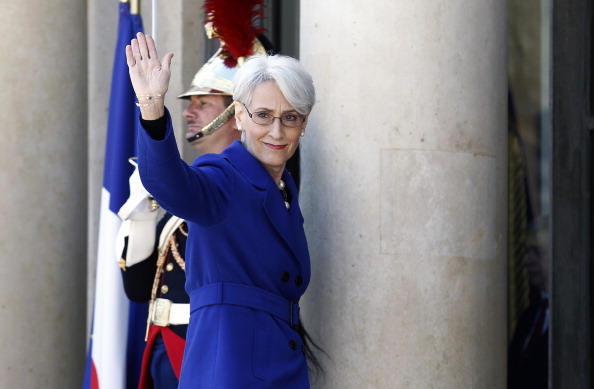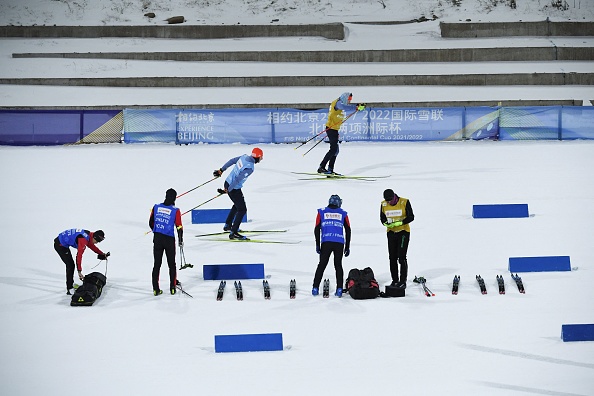
 Managing Competition
Managing CompetitionThe U.S. and European Union held its second high-level Dialogue on China this week, releasing a joint statement that pledged "continuous and close contacts" to "manage our competition and systemic rivalry with China responsibly." The two powers said they would work together to manage their relationship with Beijing and stressed "the importance of protecting intellectual property rights, critical infrastructure and sensitive technologies."
The U.S. and the European Union are adopting "increasingly convergent" views on the threat posed by the Chinese government, with both expressing concern over China's actions in the South China Sea, East China Seas, and Taiwan Strait, which "undermine peace and security in the region and have a direct impact on the security and prosperity of both the United States and European Union."
The joint statement also included areas of potential cooperation between the U.S., EU, and China, including the reduction of methane emissions and "common goals" in Iran and the Korean peninsula. Deputy Secretary Sherman and Secretary General Sannino also used the dialogue to reiterate the significance of close U.S.-EU cooperation to uphold a rules-based international order, including securing a level playing field for all countries. The Chinese Foreign Ministry responded to the dialogue urging the U.S. and the EU to abandon Cold War mentality and to instead "inject more stability and positive energies into the world."
Read more in, "Where Is the U.S.-EU-China Relationship Heading?," by Leonardo Dinic, an Advisor to the CroAsia Institute.
 Economic Shifts
Economic ShiftsChina's property market woes worsened in November, according to data published by research firm China Real Estate Information Corp, with prices for both new and resale homes falling amid weaker demand in bigger cities. Contract sales for the country's 100 top developers fell 38% from a year earlier in November.
The property sector, accounting for a quarter of the country's gross domestic product, has slowed sharply in recent months, with sentiment shaken by tight regulations and a growing liquidity crisis that has engulfed some of the country's most indebted developers. The current and near-future prospects for China's property sector is the result of spillover from the Evergrande debt debacle earlier this year, policy tightening by the Chinese government, and shifts in domestic demand, the report explains.
While the property hits don't bode well for China's economy or global investment in Chinese stocks in the near future, Beijing is focused on gaining control of its private sector and looking to tap investors closer to home. Didi Chuxing, a $39 billion company comparable to Uber, announced today that they are delisting their shares from the New York Stock Exchange, an abrupt decision representing China's decreasing reliance on Wall Street. Some experts believe Beijing anticipates the move will help the private sector align more with the CCP's increasing focus on spreading wealth and achieving policy goals.
 Athletic Interests
Athletic InterestsChina's foreign ministry spokesman, Zhao Lijian, announced this week that Beijing expects to hold the 2022 Winter Olympics "smoothly" and on schedule, despite challenges presented by the new Omicron coronavirus variant. Zhao emphasized China's experience in preventing and controlling the virus, stating this will help the Games run successfully.
Despite China's confidence that Olympic events will run without a hitch, a report recently came out that President Joe Biden is weighing a diplomatic boycott due to concerns of alleged human rights abuses in Xinjiang. However, Beijing recently reported that they have no plans to invite any U.S. politicians to the Games. While it's been cited that this is partially due to efforts to fight the pandemic, a state-run Global Times piece reporting on China's statement indicated that politics also play a role.
There has also been word of Olympic boycotts from U.S .businesses with interests in China, which China's Vice Foreign Minister Xie Feng spoke to this week. He urged American companies to push back against campaigns to boycott and encouraged U.S. business groups to "make a positive contribution" to the Games. "Boycotting the Olympics for political reasons harms the interests of athletes, violates the shared ideals and aspirations of the international society, and is unpopular," Xie said.
The Women's Tennis Association also announced this week that they are suspending tournaments in China and Hong Kong in light of ongoing concerns about the safety of Chinese tennis player Peng Shuai after after she accused a retired top Chinese official of sexual abuse. The decision represents millions in lost revenue and is likely to bolster calls for further boycotts of the 2022 Winter Olympics.
Read more in, "Tone Down the Politics to Save the Game," by Phil Cunningham, an independent scholar.
Prepared by China-US Focus editorial teams in Hong Kong and New York, this weekly newsletter offers you snap shots of latest trends and developments emerging from China every week, while adding a dose of historical perspective.
- 2021-11-19 Responsible World Leadership
- 2021-11-12 A Historic Transformation
- 2021-11-05 A Green Rivalry
- 2021-10-29 Dry Tinder
- 2021-10-22 A Diplomatic Burn
- 2021-10-15 Energy Crunch
- 2021-10-08 Stoking Tensions
- 2021-10-01 Great Power Coopetition
- 2021-09-24 Sign of Goodwill?
- 2021-09-17 State of Play
- 2021-09-10 The Last Word
- 2021-09-03 Heightened Frustrations
- 2021-08-27 China’s Backyard
- 2021-08-20 Graveyard of Empires
- 2021-08-13 A New Crossroads
- 2021-08-06 Lowering Barriers
- 2021-07-30 A Diplomatic Stalemate
- 2021-07-23 A Climate for Change
- 2021-07-16 The Trade Game
- 2021-07-09 Existential Threats